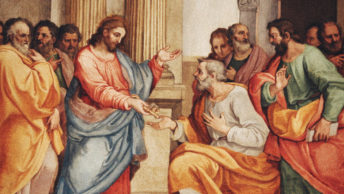
The scripture passages for the 24th Sunday in Ordinary Time all refer to reconciliation and the merciful love of God.
The gospel passage from Luke (15:1-32) recalls the parable of the prodigal son as well as the search for the lost sheep and the lost coin. Paul’s letter to Timothy (1 Tim 1:12-17) illustrates how Paul was mercifully treated despite being one of the worst sinners. The passage from Exodus (32:7-11, 13-14) reminds us of how stiff-necked the people of Israel were, yet God made of them a great nation. While all the passages point out the pain of loss and separation (whether due to sin or negligence), the key is to focus on the joy of being found and brought back into community.
Sin puts a barrier between us and God, our neighbors, and even within ourselves. Yet, God’s loving mercy brings us back. God breaks down those barriers. Reconciliation calls us back into relationship with God, with our neighbor, and allows us to re-order our lives according to God’s will. When we sin, it sometimes becomes the beginning of a downward spiral. We get caught up in the vortex and are unable to get out. This is especially true of recurring sins. Our rationale is, “Well, I’ve done this sin once already (or several times); therefore, I might as well continue. God understands me.” This is true: God does understand us. But God also wants the best for us. We have the gift of reconciliation and confession to help us get back on the right path.
But there is another aspect to reconciliation: You have heard it said,“Forgive and forget.” I would suggest that we need to “forgive and remember” so that we don’t make the same mistake again. This is especially true with relationships. If someone has wronged us, we need to forgive (not for them, but for ourselves). Moreover, we need to remember what got us into that situation in the first place. Perhaps we were too trusting. Perhaps we were oblivious to the issues (or simply just didn’t want to see the truth). Perhaps we were desperate for attention and therefore let people use (or abuse) us. In forgiving someone else, we open ourselves to the possibility of deepening our relationship with him or her. But more importantly, in forgiving them, we “let go” of the hurt which can often control our thoughts and actions. In remembering how we got into the situation allows us to be freer in our actions because we now know what (or who) to look out for. When we encounter that issue in the future, we are able to dismiss it.
Of course it is more difficult with people (especially if we live or work with them). We cannot simply dismiss or ignore them. What we can do is be aware of them. If someone has sinned against us, we still need to interact with them. This means that we must be courteous to them, treat them with respect, and genuinely try to see them as a child of God. But we also need to test them to see if they are once again worthy of our trust and love. Moreover, we need to protect ourselves so that we don’t get used again.








